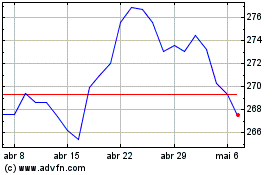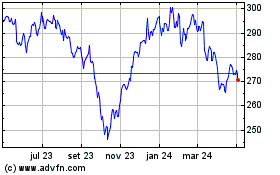Steep Drop By Oil Prices May Lead To Initial Strength On Wall Street
28 Outubro 2024 - 10:09AM
IH Market News
The major U.S. index futures are currently pointing to initial
strength on Wall Street on Monday, with stocks likely to move
mostly higher after turning in a mixed performance last week.
Early buying interest may be generated amid a steep drop by the
price of oil, as crude oil for December delivery is plummeting
$4.36 to $67.42 a barrel.
The nosedive by the price of crude oil comes as Israel’s
retaliatory attack against Iran over the weekend did not damage the
Islamic republic’s energy facilities.
Overall trading activity may be somewhat subdued, however, as
traders look ahead to the release of key U.S. economic data later
in the week.
The monthly jobs report as well as a report on personal income
and spending that includes the Federal Reserve’s preferred
inflation readings are likely to be in the spotlight.
Reports on third quarter GDP, consumer confidence, pending home
sales and manufacturing sector activity may also attract some
attention.
The data could impact the outlook for the economy as well as
expectations regarding how quickly the Fed will lower interest
rates.
Earnings news is also likely to be in focus in the coming days,
with Alphabet (NASDAQ:GOOGL), Amazon (NASDAQ:AMZN), Exxon Mobil
(NYSE:XOM), Intel (NASDAQ:INTC), McDonald’s (NYSE:MCD), Meta
Platforms (NASDAQ:META), Microsoft (NASDAQ:MSFT) and Pfizer
(NYSE:PFE) among the companies due to report their quarterly
results.
After ending Thursday’s session on opposite sides of the
unchanged line, the major U.S. stock indexes turned in another
mixed performance during trading on Friday. While the tech-heavy
Nasdaq added to yesterday’s strong gain, the Dow extended its
losing streak to five sessions.
The Nasdaq reached a new record intraday high in early trading
but gave back ground over the course of the session before ending
the day up 103.12 points or 0.6 percent at 18,518.61.
Meanwhile, the Dow slid 259.96 points or 0.6 percent to
42,114.40, pulling back well off last Friday’s record closing high.
The S&P 500 also edged down 1.74 points or less than tenth of a
percent to 5,808.12.
The major averages also turned in a mixed performance for the
week. The Dow tumbled by 2.7 percent and the S&P 500 slumped by
1.0 percent, but the Nasdaq rose by 0.2 percent.
Stocks moved mostly higher early in the session, with the major
averages all moving to the upside amid ongoing optimism about the
outlook for the economy.
Adding to the economic optimism, the University of Michigan
released revised data showing consumer sentiment unexpectedly
improved in the month of October.
The University of Michigan said its consumer sentiment index for
October was upwardly revised to 70.5 from a preliminary reading of
68.9. Economists had expected the index to be upwardly revised
slightly to 69.0.
With the bigger than expected upward revision, the consumer
sentiment index is now modestly above the final September reading
of 70.1.
The consumer sentiment index has now increased for the third
consecutive month, reaching its highest level since hitting 77.2 in
April.
Buying interest waned over the course of the session, however,
as treasury yields rebounded following yesterday’s pullback amid
lingering concerns the Federal Reserve will lower interest rates
slower than previously anticipated.
The Fed is still widely expected to lower rates by a quarter
point next month, but CME Group’s FedWatch Tool currently indicates
a 24.0 percent chance the central bank will leave rates unchanged
in December.
The extended losing streak by the Dow came amid notable declines
by shares of McDonald’s (NYSE:MCD), Dow Inc. (NYSE:DOW) and
Travelers (NYSE:TRV).
Airline stocks showed a substantial rebound after falling
sharply on Thursday, with the NYSE Arca Airline Index surging by
2.0 percent.
A sharp increase by the price of crude oil also contributed to
significant strength among oil service stocks, as reflected by the
1.3 percent gain posted by the Philadelphia Oil Service Index.
On the other hand, gold stocks came under pressure despite a
modest increase by the price of the precious metal, dragging the
NYSE Arca Gold Bugs Index down by 2.1 percent.
Interest rate-sensitive utilities and housing stocks also saw
notable weakness amid lingering concerns about the outlook for
rates.
McDonalds (NYSE:MCD)
Gráfico Histórico do Ativo
De Fev 2025 até Mar 2025

McDonalds (NYSE:MCD)
Gráfico Histórico do Ativo
De Mar 2024 até Mar 2025
